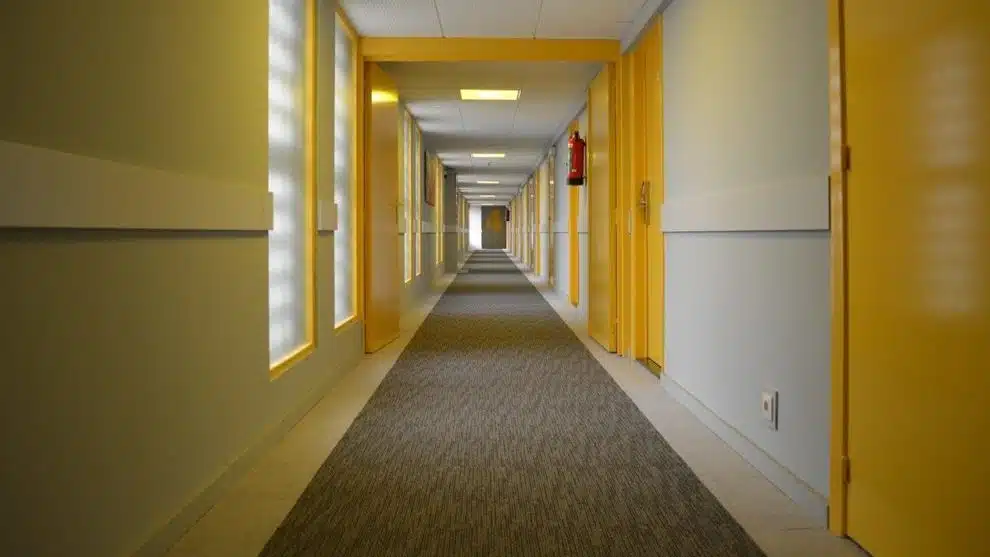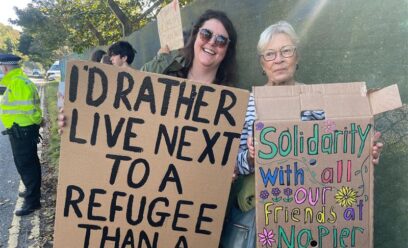When is a hotel not a hotel? How to talk about hotels and the asylum system
Posted by Julia Rampen on February 23, 2022The word ‘hotel’ makes the public think that people seeking safety are getting a luxurious holiday for free, instead of the grim reality. How do we change this?

Hotel. For 99% of the British public, the word conjures up ideas of luxury, glamour and maybe a piano tinkling in a ballroom – never mind that most of us are more likely to stay in a Holiday Inn than the Ritz.
But while most of the time the gap between imagination and reality is a harmless fantasy, unfortunately when it comes to asylum seekers, it turns into a messaging problem.
First, the idea that hotels are a luxurious treat makes it very difficult for asylum seekers to complain, even when the conditions they are living in are truly dire. As one member of the public put it in response to a story about terrible food served in a hotel: ‘I work, and have done all my life, and I am English but cannot afford to turn my heating on until it’s the depths of winter. Who can I complain to?’
Secondly, hotels are often local landmarks. Even without the spectre of the far right targeting hotels housing asylum seekers, the use of hotels housing people seeking safety does have a knock-on effect on the local population, who turn to the local media to complain about weddings cancelled and rooms booked up. These might be mild inconveniences compared to fleeing your home under bombardment, but they feed public discontent, and embolden otherwise moderate politicians to stoke the flames.
So how do we create a better narrative about hotels? This is a conversation we’ve had regularly at IMIX. Here’s one suggestion – stop calling them hotels.
Why should we stop calling them hotels?
According to the Cambridge English Dictionary, a hotel is a building where you pay to have a room to sleep in, and pay to eat meals. Merriam Webster describes it as providing meals, entertainment, and various personal services. Collins suggests it is somewhere you stay in on holiday. What all these definitions have in common is that they acknowledge some aspect of personal choice.
People seeking safety, on the other hand, stay in temporary accommodation they have no choice over. They sleep in rooms they are told to sleep in and eat the food they are told to eat. Their neighbours are constantly changing. They can’t afford transport, so they can’t get to know people in the local community, only watch it from the window, and they don’t know whether they will be staring at the same view for months or be moved tomorrow.
Their kids are boxed up in a small space that was never designed for families to spend all day in. Sometimes it’s unsafe to even leave the building for a breath of fresh air due to the angry protesters outside. If they’re unwell, they have no one to turn to, like the Afghan woman who was so isolated from medical support that she gave birth in a hotel room with only the support of a volunteer.
On a more fundamental level, for people seeking safety, their accommodation doesn’t represent choice, but the absence of it. As Alomari put it in a recent Asylum Matters report on this sort of accommodation:
‘Let’s say when you take choice from people they will start feeling they are not human any more. The basic choices like when I want to eat, what I want to eat, where I want to go, what I want to do. That’s basic choices for a human being and when you take that choice from them mentally — it’s the worst year I have had in my life. You always feel you’re vulnerable, you always feel you’re not there.’
How to explain this to the media or other key influential individuals
It’s hard to boil down these feelings of powerlessness to a few sentences, but here are some suggestions on how to change the narrative:
Don’t refer to hotels. Instead, try talking about “temporary accommodation”, “segregated accommodation” or “institutional accommodation” with “fixed meals” and “families sharing one room”, and don’t forget to mention if it’s isolated, lacking internet, or any other unglamorous details.
Share the voices of those inside it. You can do this while protecting the privacy of those in residence by collecting anonymous testimony, and sharing it with a local journalist (check out this Asylum Matters report for inspiration).
If you do this, try to stick to accounts that educate the public about the specific reality of the accommodation, like the one quoted above, rather than blanket statements that might cause a backlash, such as ‘I hate living in a hotel’.
Collect photos. This photo of the dismal dinner served at one ‘hotel’ shows clearly that the person complaining was not just ‘being fussy’.
Use the voices of well-grounded locals who agree with you. It’s easier to argue against a nameless ‘economic migrant’ who says the conditions are terrible than the grandmother who volunteers at a local foodbank.
Keep the focus on the government and its policies. If the decision to house asylum seekers in this accommodation was made by the Home Office and a private contractor like Serco, say so. Most people don’t understand how the asylum system works and this is a good chance to raise awareness of the real flaws in the system.
Key messages when talking to a journalist
Some of the following messages may come in useful:
People fleeing regimes like the Taliban or wars like the one in Syria just want a chance to rebuild their lives. They can’t do that if they are stuck in segregated accommodation, sharing a room with their entire family and unable to meet people in the local community.
People seeking safety didn’t choose to leave their countries, and many have lost everything. Leaving them isolated in institutional accommodation only benefits private contractors. We should give them a chance to cook their own food, get to know their new neighbours and start rebuilding their lives.



